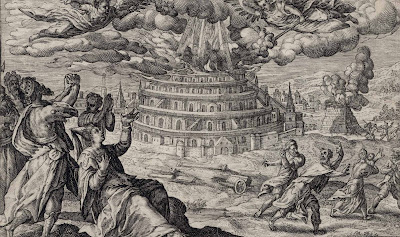Crispijn
de Passe the Elder (1564–1637)
“Destruction of the Tower of Babel”, 1612, from the series of engravings
made for the first edition of the “Liber Genesis.”
Engraving on fine laid paper
with small margins and lined with added margins of a support sheet.
Size: (support sheet) 28.3 x 29.7 cm; (sheet) 9.8 x 14.1 cm;
(plate) 8.5 x 12.7 cm; (image borderline) 7.5 x 12.7 cm
Lettered on plate in two lines of Latin verse in two columns below
the image borderline: “Pyramidem vanae gentes ... hoc Babylonis opus.”
State i (of iii)
Note that my attribution of this print to the first state is
because the impression is crisp with little sign of wear. Moreover, the copy held by
the Metropolitan Museum of Art (see https://www.metmuseum.org/art/collection/search/414782)
is numbered “26” below the Latin verses which this impression is not. Presuming that the
numbering on the Met impression is on the plate rather than inscribed by hand (the number is not
mentioned in the description by the Met) this may indicate that there are two
states. Going further, the copy held by the Rijksmuseum (http://hdl.handle.net/10934/RM0001.collect.161323)
I believe is a third state impression as the Latin verses have been replaced with
Dutch text and the number “26” has been shifted to the far right corner. Note
that there were three editions of this print and the final one (held by the
Rijksmuseum) was published by Isaac Greve in Amsterdam between 1700–50.
Hollstein XV.289-91.855; Veldman 178.26 (Ilja Veldman 2001, “Profit
and Pleasure: Print Books by Crispijn de Passe”. Rotterdam.)
The Rijksmuseum offers the following description of this print:
“God is destroying the tower of Babel. To punish the people for
their pride, he confuses the language of the people, so that they can no longer
understand each other. In the margin a two-line caption in Dutch.” (ibid.)
Condition: a strong, well-inked and faultless impression with
small margins in near pristine condition (i.e. there are no tears, holes,
folds, abrasions, stains, foxing or signs of use) laid on an archival support
sheet.
I am selling this museum quality lifetime impression for AU$214
(currently US$168.31/EUR136.23/GBP120.99 at the time of posting this listing).
Postage for this print is extra and will be the actual/true cost.
If you are interested in purchasing this small but magnificent and
rare engraving—mindful that the British Museum does not hold a copy and the
other major museums have later impressions—please contact me
(oz_jim@printsandprinciples.com) and I will send you a PayPal invoice to make
the payment easy.
This print has been sold
Sometimes it is the simple principles that make an image
memorable. For instance, note how de Passe has visually explained the spatial
positions of the figures in the lower left corner by modelling the closest two
with light and shade rendered in contoured strokes set against the figures further
back rendered as dark silhouettes with crossed hatched angled strokes
while the sky beyond is treated in aligned horizontal lines. Note also how de
Passe has connoted weight and mass in his representation of the clouds by
darkening the lower aspects of their forms and ensured that there are no
concavities within the complex of the cloud’s convex forms. To my eyes, one of
the most simple and effective of all principles that de Passe employs is his
use of dots to give a grit of surface texture to the landscape and the
suggestion of rain drops to the radiating burst from heaven hitting the tower
at its top.








No comments:
Post a Comment
Please let me know your thoughts, advice about inaccuracies (including typos) and additional information that you would like to add to any post.